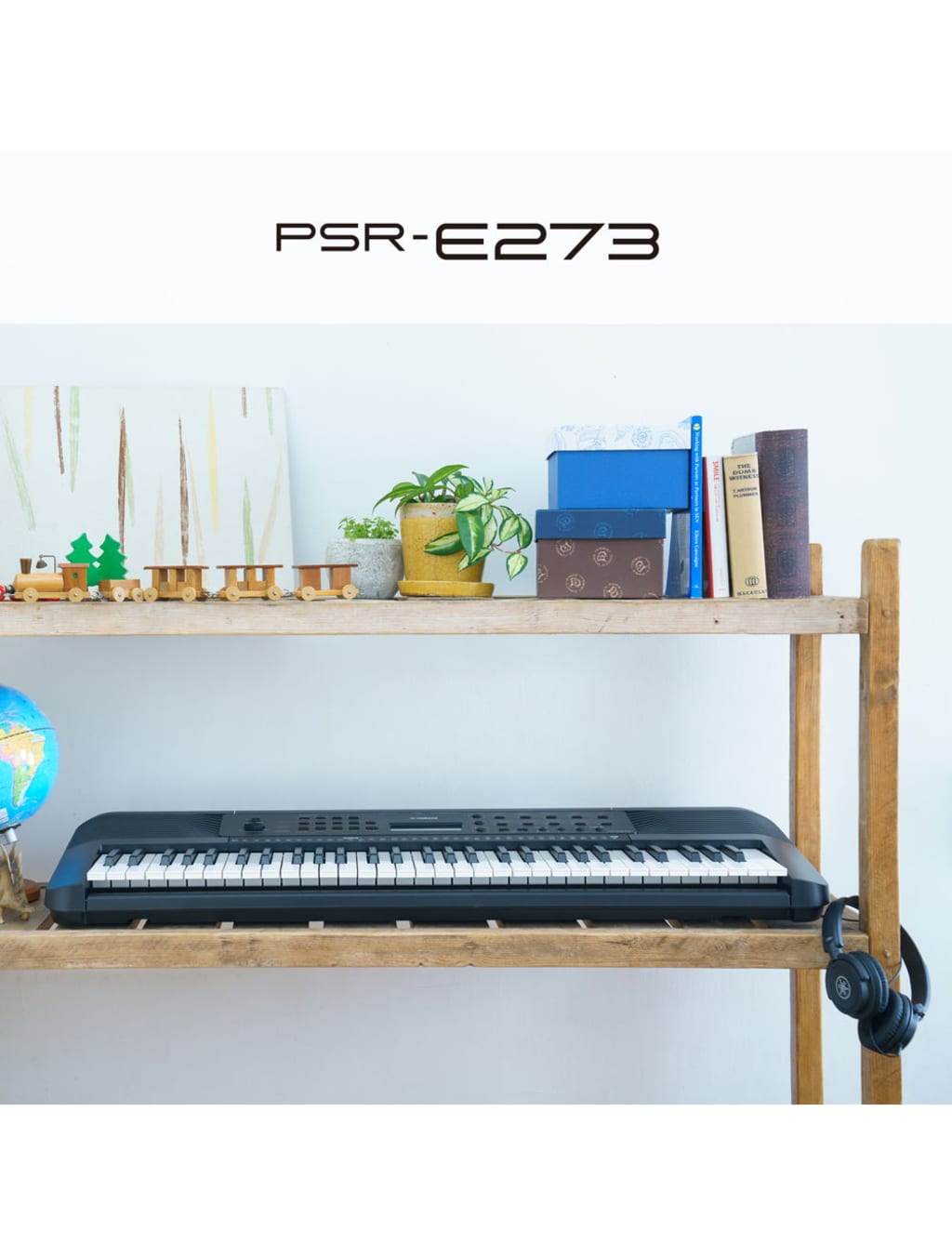Product review of Yamaha PSR-E273 keyboard:
#Yamaha #Keyboard #2023 #Musiclovers

Product review of Yamaha PSR-E273 keyboard:
The Yamaha PSR-E273 is a portable keyboard that is designed for beginners and intermediate players. It features 61 keys, 401 high-quality instrument voices, and 143 auto-accompaniment styles, making it suitable for a wide variety of musical styles.
One of the standout features of the Yamaha PSR-E273 is its compact and lightweight design. It weighs only 4.6 kg, making it easy to carry around and store. Additionally, it can be powered by batteries, so you can use it anywhere without needing to be near a power outlet.
The keyboard also comes with a variety of helpful features for beginners, such as a built-in lesson function, which can help you learn to play various songs step by step. There is also a "Yamaha Education Suite" feature that provides a variety of practice exercises and lessons to help you improve your playing skills.
In terms of sound quality, the Yamaha PSR-E273 delivers impressive results. The keyboard's 401 instrument voices cover a wide range of sounds, from pianos and guitars to strings and drums. The voices are all sampled from high-quality instruments, so they sound authentic and realistic.
Overall, the Yamaha PSR-E273 is a great choice for beginners and intermediate players who are looking for a portable, easy-to-use keyboard with a variety of features and high-quality sound. Its compact design, battery power option, and helpful learning features make it an excellent option for those who want to learn to play music or take their playing to the next level.
Pros and cons of yamaha e273
Pros:
Affordable: The Yamaha PSR-E273 is priced reasonably, making it accessible to beginners and budget-conscious musicians.
Compact and Portable: The keyboard is lightweight and can be powered by batteries, making it easy to carry and use on the go.
High-Quality Sounds: The keyboard features 401 high-quality instrument voices that sound authentic and realistic.
Beginner-Friendly: The keyboard comes with a variety of helpful features for beginners, such as a built-in lesson function and the "Yamaha
Education Suite" feature that provides practice exercises and lessons.
Easy to Use: The interface is straightforward and easy to navigate, even for those who have never used a keyboard before.
Cons:
Limited Key Range: The Yamaha PSR-E273 has only 61 keys, which may not be enough for more advanced playing.
Limited Polyphony: The keyboard has a maximum polyphony of 32, which means that certain sounds may cut out if too many keys are played at once.
Limited Connectivity: The keyboard has limited connectivity options, with only a headphone jack and a USB port for connecting to a computer.
Basic Build Quality: The keyboard is made of plastic and may not be as durable as higher-end models.
Limited Customization: The keyboard has limited options for customizing sounds and effects.
15 tips to beginner to play keyboard
Get comfortable with the keyboard: Take some time to get familiar with the layout of the keyboard, the names of the keys, and the feel of the keys when pressed.
Practice proper hand position: Make sure to keep your fingers curved and your wrists level while playing.
Start with easy songs: Begin with simple songs that have a limited range of notes, so you can focus on building your skills.
Practice regularly: Make a habit of practicing for a set amount of time each day to build muscle memory and improve your skills.
Use a metronome: Use a metronome to help you develop a steady rhythm and improve your timing.
Learn music theory: Learning the basics of music theory can help you understand how to read sheet music and play more effectively.
Take lessons: Consider taking lessons from a qualified teacher to get personalized instruction and feedback.
Record yourself: Record yourself playing to listen back and identify areas for improvement.
Practice scales: Practicing scales can help you develop your finger strength and dexterity.
Play with others: Playing with other musicians can help you develop your timing and learn new techniques.
Experiment with different sounds: Experiment with the different voices and effects available on your keyboard to discover new sounds and tones.
Memorize songs: Work on memorizing songs so you can play them without reading sheet music.
Play along with recordings: Play along with recordings of your favorite songs to learn new techniques and improve your timing.
Use online resources: There are many online resources available, such as tutorials and sheet music, that can help you improve your skills.
Have fun: Remember to have fun and enjoy playing the keyboard. Playing music is a rewarding and enjoyable experience, so make sure to enjoy the process!
Which apps will help to learn keyboard?
There are many apps available that can help you learn to play the keyboard. Here are a few popular ones:
Simply Piano: Simply Piano is a popular app that uses artificial intelligence to help you learn to play the keyboard. It provides interactive lessons and feedback on your playing, and can be customized to your skill level.
Yousician: Yousician is a music education app that offers lessons for a variety of instruments, including the keyboard. It provides personalized instruction and feedback, and includes a variety of songs and exercises to help you improve your skills.
Piano Academy: Piano Academy is an app that offers interactive lessons and exercises for beginner and intermediate piano players. It includes a variety of lessons on music theory, technique, and playing skills.
Piano Marvel: Piano Marvel is a comprehensive app that provides instruction and feedback on all aspects of playing the keyboard, including sight-reading, technique, and performance skills.
Playground Sessions: Playground Sessions is an app that offers video lessons and interactive sheet music for a variety of songs and skill levels. It provides feedback on your playing and includes a variety of practice exercises to help you improve your skills.
These apps can be a great supplement to traditional lessons or can be used on their own to help you learn to play the keyboard. They offer a variety of features and customization options to suit different learning styles and skill levels.
Which keyboard is best Casio or Yamaha?
Both Casio and Yamaha make quality keyboards, and which one is "best" will depend on your individual needs and preferences. Here are some factors to consider:
Sound quality: Both Casio and Yamaha offer high-quality sounds, but some people may prefer the tone of one brand over the other. It is best to try out both brands in person to see which one you prefer.
Features: Both brands offer a range of features, such as built-in lessons, different instrument voices, and connectivity options. Consider which features are important to you and which brand offers them.
Price: Casio keyboards tend to be more affordable than Yamaha keyboards, so if you are on a budget, Casio may be a better option for you.
Durability: Both brands make durable keyboards, but some people may prefer the build quality of one brand over the other. Look for keyboards with sturdy construction and reliable components.
Reputation: Both brands have a good reputation in the industry, but some people may have a preference for one brand based on their personal experience or reputation.
Ultimately, it is best to try out both brands in person and compare their features and sound quality to determine which one is best for your needs and preferences.
Product link: https://usa.yamaha.com/products/musical_instruments/keyboards/portable_keyboards/psr-e273/index.html
Youtube link: https://youtu.be/GEjENvcs5mQ
About the Creator
Suresh Natarajan
Welcome to my page where I share my love for the Bible. I am a deeply faithful person, and it brings me great joy to share the lessons I've learned through my faith. Join me as I explore biblical stories and daily prayer! Please Subscribe!






Comments
There are no comments for this story
Be the first to respond and start the conversation.